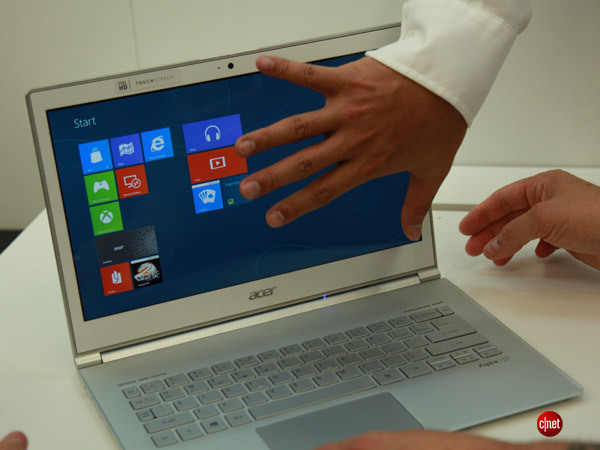Will Windows 8 be another Vista?

"Too many cooks"; "an unmitigated disaster"; "the worst thing since fried Vista". Oh, dear. Some people really have it in for Windows 8, but there are good reasons why.

A touch interface, but you can't touch it!
(Credit: CNET)
On the face of it, it appears we have an up-down-up-down approach to Microsoft. From Windows XP — good; to Windows Vista — bad; to Windows 7 — good; to Windows 8 — not so good.
We can reasonably assume from the successes of its predecessor that the next-generation operating system tries to improve too much, too quickly, and far too radically. It's failing to do so.
Out of the backlash, Microsoft claws back what it can in the following operating system, only to rinse and repeat the process again.
It's like Microsoft is stuck in a loop and someone needs to bang on its roof to get it whirring again.
A snippet of who's saying what is below. Grip tight, Windows fans.
MarketWatch's John Dvorak:
Windows 8 looks to me to be an unmitigated disaster that could decidedly hurt the company and its future...No business will tolerate this software, let me assure you. As a productivity tool, it is unusable.
Pocket-Lint's Dan Sung:
We're not saying that Windows 8 is the best thing since sliced wafers. It's more like the worst thing since fried Vista, but don't let that put you off. The trouble is, what with Windows 8 and that added Metro interface all built with touch in mind, being stuck with a mouse can be all too much of a drag.
Slate's Farhad Majoo:
I wonder if Microsoft knows that masses of Windows users are going to revolt against this new interface. If Microsoft wants to preserve and extend its OS hegemony, it's going to have to hold their hands through the changes, perhaps with more on-screen prompting and a large media campaign.
And then there's my take:
Windows 8 won't be a complete disaster, but it won't be what Microsoft wanted it to be in the first place. Too many have stuck their oar in to claim what works best for users in this crazy day and age of shifting values. Microsoft has a "too many cooks" problem; $20 says Windows 9 looks remarkably similar to Windows 7.
A week later, Paul Thurrott, of all people, who runs a "supersite" for Windows, made the same comparison:
But this comparison [between Vista and Windows 8] is actually apt, just not for the reason you think. Windows 8 is very much like Vista, because it represents a sea change, a huge platform bet that will confuse and confound some, even while it sets up Windows for another decade of expansion. Maybe there will be a Windows 9 that will clean up the mess, like Windows 7 cleaned up Vista's mess.
You can probably see a running trend: it's Metro, Metro and — oh look — more Metro.
If I'm honest, I found more neutral reports and positive reviews from the pool than negative ones. That said, I didn't need to look far for the blazes of criticism, and neither will many when the wider consumer market hears about Windows 8. They'll search for it and click on the first few things that come up. If it turns out to be a bad review, it may well cost Microsoft a customer.
Dvorak hit the nail on the head. It's the enterprise we are looking at more than anything. The consumer market will go for anything that's given to them, bar a subsection staunchly set in their ways. There's nothing wrong with that. I'm talking about my own parents, who until recently were stuck on an out-of-date, barely updated Windows XP machine.
Windows 8 will likely prove popular by Microsoft's standards, and sell like hotcakes. It has to. What else are PCs going to run? With a spate of tablets set for release over the coming months ahead of Windows 8's launch, the operating system will likely shake up the market enough to get a foot in the highly coveted tablet space.
But the ordinary, enterprise-working fellow, those with a desktop PC, a work-issued laptop so old it requires hand cranking to get going, or even a top-of-the-range ultrabook using teleworker — it's this chunk of Windows 8 users who will be left out in the cold.
Metro, in a nutshell, kills productivity. It's not just the live tiles, or the Start screen. It's the whole ethos — no, scrap that — it's the whole attitude of the new user interface.
The best that's going to happen is that users in a BYOD-trending world will opt for a tablet over a "traditional" PC, and that will likely come with Windows 8. Failing that, they'll opt for an iPad if they really want a tablet. Other than that, if they want the traditional PC without Windows, they can stick with Windows 7 until 2015 for the enterprise, or they can — dare I say it — opt for a Mac.
The devil is in the details. Dvorak thinks "Microsoft gives up on this soulless Metro interface and gets a new design team, fast". It has to. Again, I would not be surprised if Microsoft's Windows 9 looks a great deal like Windows 7 did.
Because let's face it: the old Start menu rocks, and people really, really don't like change.
Via ZDNet US